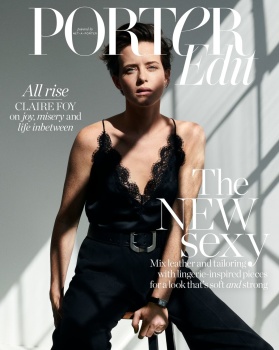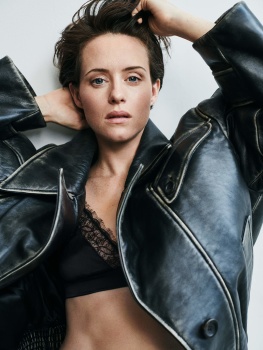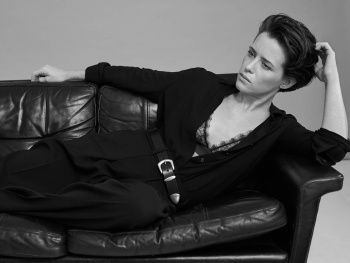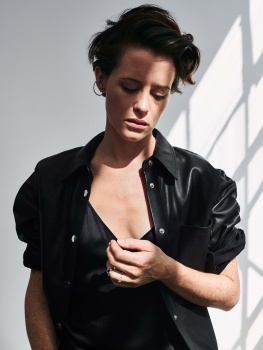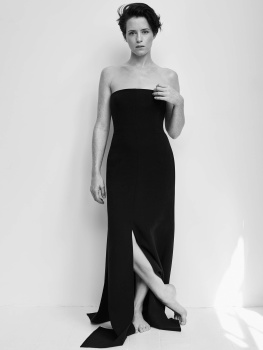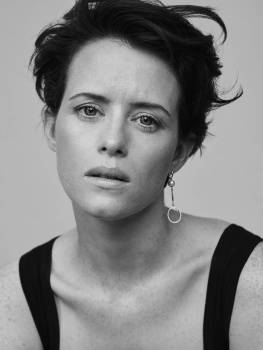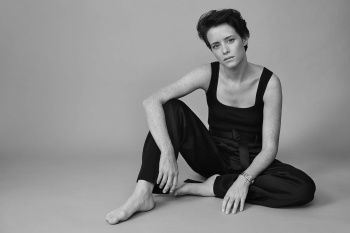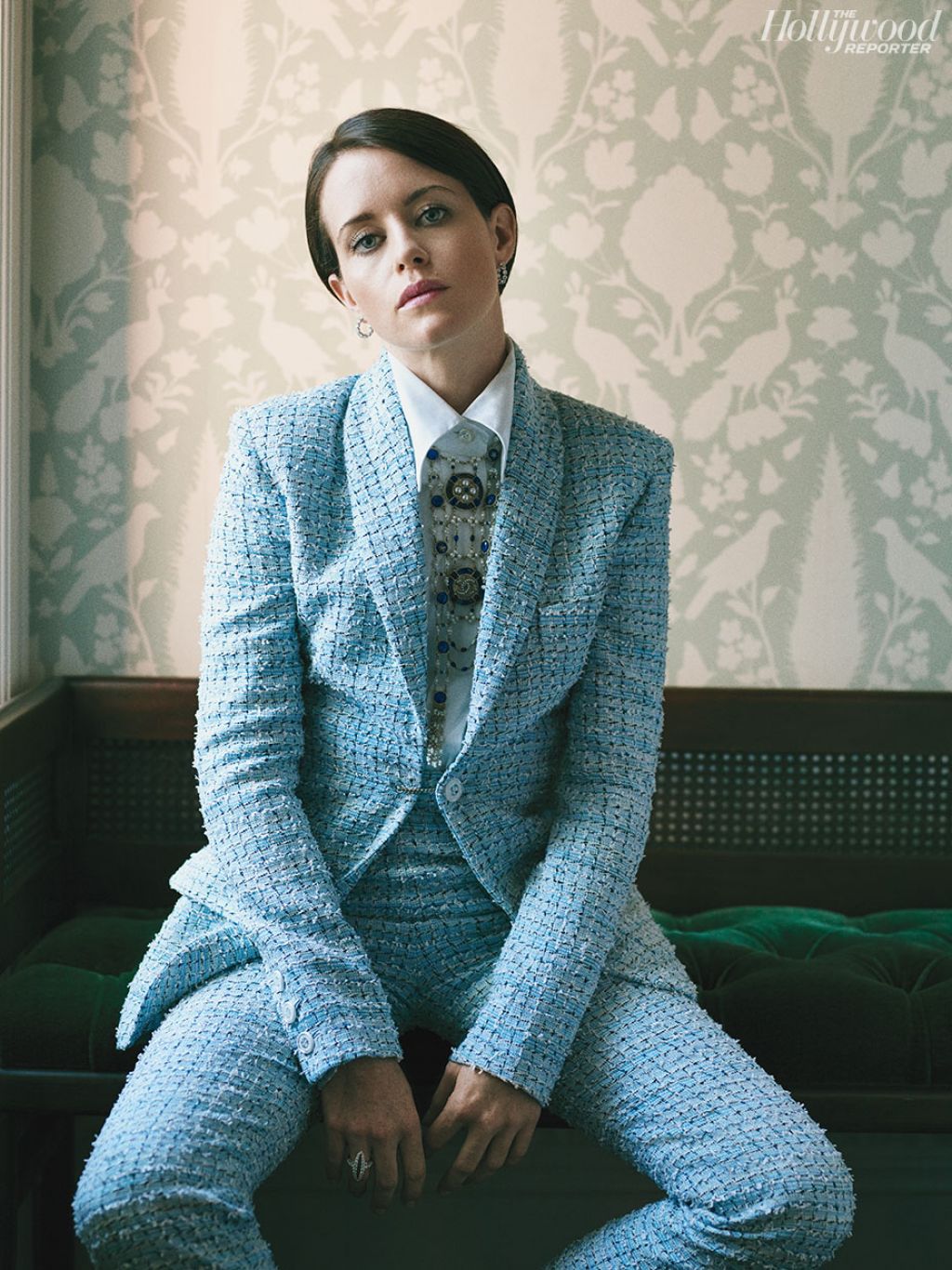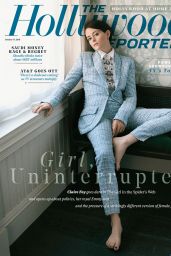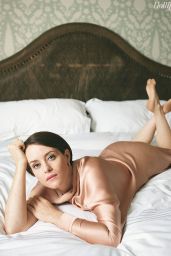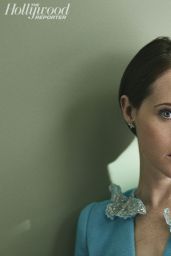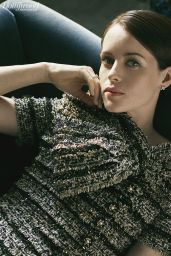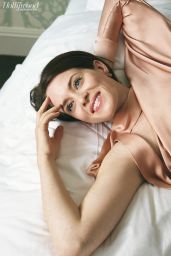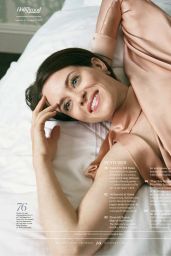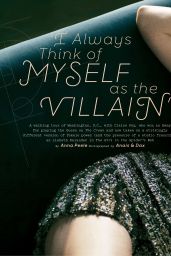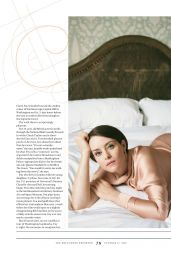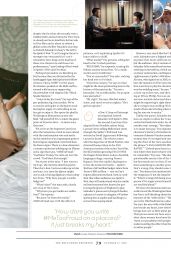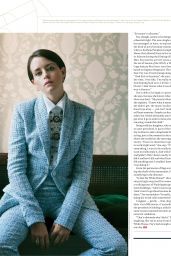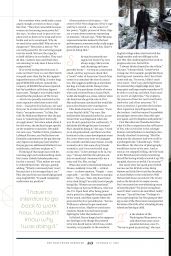She battled dissension and betrayal both on- and off-screen amid The Crown’s pay-gap controversy, but CLAIRE FOY says she’s made peace with her “dramatic” life. The actress talks to SUSIE RUSHTON about living with anxiety and finding strength in Lisbeth Salander.
The last time millions of us saw Claire Foy was as Queen Elizabeth II, at Buckingham Palace, at the end of season two of Netflix’s The Crown. Foy’s performance won her a Golden Globe and an Emmy, and confirmed the British actor’s transatlantic star status. So I immediately spot her, even from behind, outside the west London members’ club where we’ve arranged to meet: that regal posture, and a certain neatness, plus an oyster-pale complexion and dark hair. She had arrived early, but the hostess didn’t recognize her, or find our reservation, and gently ejected the Queen of England back out onto the pavement. Foy was too polite, of course, to give her name.
Cue cheerful eye-rolling from the actress, whose demeanor – once we are settled inside – swings between drolly reserved and outright giggly. Dressed in a short beige raincoat, a white T-shirt and blue Levi’s with a red velvet GG Marmont bag and high-heeled Rouje boots, the 34-year-old looks like a Parisian gamine. Her only ‘Crown’ jewel is a 1957 Rolex, a gift to the leads at the end of last season.
Though currently on a break from acting, Foy is about to appear in Damien Chazelle’s First Man, opposite Ryan Gosling’s moon-conquering Neil Armstrong, as his wife, Janet (one of a number of high-profile roles she landed after The Crown). How awful, I say, being married to Ryan Gosling. “Well, I wasn’t married to Ryan Gosling,” she deadpans. “Unfortunately, I was married to Neil Armstrong.”
Foy, naturally, brings real psychological depth to a part that could have been an add-on. “Janet and Neil had a very equal relationship. She took care of the home, but she had her own job as a swimming coach and was independent of him, because she knew from the moment they got together that he might die.” Janet’s rage at NASA’s treatment of the Apollo 11 wives also adds grit. “There was a lot of resentment towards NASA. They were very disrespectful of [the wives’] roles in these men’s lives. Do you know, they used to stop the wives from going to the launch? Because they might be distracting,” says the actress disbelievingly.
Foy had her own encounter with institutional sexism in March, when it emerged she had been paid £10,000 less per episode of The Crown than her on-screen husband Matt Smith. The production company reportedly promised to give her back pay, but she has since disputed this, and the experience still stings regardless. “I was deeply hurt by it,” she says now, “because I’d been working on that show for two years. I loved everybody on it. And then I realized, there’s been a big, fat, dirty secret that nobody’s ever talked about. But then there was also that thing [of being] an inadvertent spokesperson. Why did it have to be me? I could have said nothing. And I think everyone would have preferred that. But I thought, if I do that, I will be cheating myself and all the other women I know.” She was ambivalent about speaking out because she’s aware of her privilege. “You feel lucky to have a job. It’s so competitive. So, in that way, they rely on competitiveness and actors’ vulnerability to say, ‘They’ll accept it for 10 grand less.’”
It was neither luck nor sharp elbows that won Foy her next role, but rather her incredible range as an actor. She plays Swedish anti-heroine Lisbeth Salander in upcoming film The Girl in the Spider’s Web, directed by Fede Alvarez and based on a book written by David Lagercrantz after the death of Stieg Larsson, the author of the original Millennium trilogy. “I have had a lot of experience of playing fictional characters, adaptations of novels, or really famous people, so I’ve already experienced how everybody will criticize and compare,” she says of following Noomi Rapace and Rooney Mara in the role. “It’s sort of the allure, as well: it’s such an uphill struggle – you’re doomed from the start.” Deliberately, her Lisbeth looks stronger. “I’m quite an athletic build, when I want to be, but I was never going to get really thin. I can’t bear the idea of projecting that image,” she says.
Foy’s Lisbeth is an updated take on the character Larsson created in 2002. “The Lisbeth he wrote isn’t particularly relevant in modern-day society. Aesthetically speaking – the piercing, tattoos, the whole emo thing. And Fede and I didn’t want her to be titillating. I always think if there’s an element of lesbianism in films that’s just titillating, it’s for the male gaze, and I’m not doing that. And there isn’t really time for her to have sex with anyone,” she says cheerfully, “she’s running around so much.”
The shooting of that movie over three months in Berlin and Stockholm coincided with an announcement, in February, that Foy had separated from her husband, the British actor Stephen Campbell Moore. In 2017, he had undergone life-saving surgery for a recurrent brain tumor, just as she had been working on the second season of The Crown. It must have been a horrendously stressful year, I say, given the added pressure of their separation. “Yeah,” she replies, pausing before going on. “A long time ago, I gave up on the idea of happiness. I think you can be incredibly, deliriously happy one minute, and be miserable the next.” Is she talking about romantic love, or in general? “Just in life. I’ve realized that my life is quite dramatic, and that’s OK. I’m really happy, but…” another enormously long pause, during which she seems to gather up her thoughts, “I’m not sorted, at all. I don’t expect any moment to last.”
This shouldn’t be put down to a pessimism shared among Brits. Foy’s younger years were bumpy: juvenile arthritis plagued her childhood, while a benign tumor in one eye damaged her confidence, aged 17, just as she applied to university, where she studied drama and screen studies. “I had been too scared to apply for straight drama because it involved an audition,” she says, startlingly.
It was the sudden global fame that came with The Crown that forced Foy to come to terms with the anxiety that had dogged her for a decade. She’s never had panic attacks, but her illness has been bad enough to compel her to seek help. “When I was 23, I had a breakdown. I didn’t sleep or eat for a month. It was awful,” she says. “My life had changed. I felt overwhelmed. I was on stage at the time and working, and I’d just got a really big job [the lead in the BBC’s Little Dorrit]. I just couldn’t cope.”
Foy puts her recovery down to the arrival of her daughter, Ivy Rose, in 2015. “Having her made me think, ‘You need to sort your life out.’ I just didn’t have to live like that. It was unbearable. I was sick of myself.” The way Foy talks about her anxiety now suggests that she’s sought therapy (“At least I’m aware of what I’m doing now”) but she says that she doesn’t take medication. In the meantime, she relies on family: her older sister and brother, who live in south London (Foy lives in the north of the city), and her mother, who helps care for Ivy Rose.
Is she now a de facto single parent? “No, no,” she says, stoutly. “Very much co-parenting.” While Campbell Moore no longer lives in the same house, he is nearby; and besides, the couple still share “the reality of both doing the same job, understanding the complexities of it,” says Foy. “It was always going to be like that, anyway, because I always wanted to go back to work. But there’s only one mum, and there’s only one dad.”
Despite the competing pressures of parenthood and success, Foy is determined to enjoy her moment. She visibly thrills as she describes fittings for red-carpet outfits and, as we finish and she checks her phone, can’t help but coo at snapshots of handbags sent to her by her stylist. In a week, she will fly to LA for two days for the Emmys (and as we now know, win), minimizing the time away from her daughter. “I love traveling, but I don’t want to be away from her. When she goes to school next September, that’s it, it’ll mean I’m London-bound,” she says firmly. But there have been times, she’s keen to tell me, when work, travel and family have happily collided. “When I was making Unsane [the 2017 film by Steven Soderbergh] we lived in New York for a month. It was amazing. The whole family came. And I hope when my daughter’s older and she says, ‘We never go anywhere’, I can look back and say, actually, you went to Africa, when you were six months old, for The Crown. That’s when it’s a real joy.”
First Man is out now; The Girl in the Spider’s Web is out November 9 (US)































































